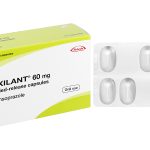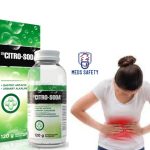Which Over-The-Counter Medication Works Best for Heartburn?

Over-the-counter (OTC) medications offer a range of options for treating heartburn, providing relief from the discomfort and symptoms associated with this common condition. If your heartburn symptoms persist despite OTC treatment, consulting your doctor is advisable, as they can suggest further interventions alongside lifestyle adjustments. It’s also important to rule out the possibility of gastroesophageal reflux disease (GERD) as the underlying cause of your symptoms.
Antacids are among the nonprescription medications available for managing heartburn. These products work by neutralizing stomach acid, which helps alleviate issues such as heartburn, sour stomach, acid indigestion, and stomach upset. Some antacids even contain simethicone, a substance that aids in the expulsion of gas. It’s worth noting that certain antacids contain components that might induce either diarrhea, as seen with magnesium-based ones, or constipation, which can occur with those containing aluminum.
Several examples of antacids include:
• Aluminum Hydroxide Gel: This antacid assists in neutralizing stomach acid and provides relief from heartburn. Its effectiveness lies in its ability to counteract excess acid, which contributes to heartburn and related discomfort.
• Calcium Carbonate (Alka-Seltzer, Tums): Calcium carbonate is a common ingredient found in antacids. It functions by neutralizing stomach acid and reducing heartburn symptoms, allowing you to experience relief from the discomfort associated with excessive stomach acid.
• Magnesium Hydroxide (Milk of Magnesia): Magnesium hydroxide works as an antacid that neutralizes stomach acid. It helps alleviate heartburn symptoms and the accompanying discomfort that can occur due to excess stomach acid.
• Gaviscon, Gelusil, Maalox, Mylanta, Rolaids: These are brand names for various antacid products that combine different active ingredients to provide effective relief from heartburn and related issues. They often contain a mix of aluminum and magnesium compounds.
• Pepto-Bismol: While commonly known for its role in relieving stomach discomfort and diarrhea, Pepto-Bismol also has antacid properties that can help ease heartburn symptoms.
When using antacids, it’s crucial to adhere to the dosing instructions provided by your doctor or those indicated on the product’s packaging. For antacid tablets, chewing them thoroughly before swallowing can expedite relief. Following the recommended guidelines ensures you avoid the risk of overdosing or overusing antacids. However, it’s important to be aware that antacids can have potential side effects, including constipation, diarrhea, alterations in the color of bowel movements, and stomach cramps.
Managing Heartburn with Acid Reducers
When it comes to treating heartburn, there are two main categories of drugs that are designed to reduce the production of acid in the stomach: histamine antagonists (H2 antagonists or H2 blockers) and proton pump inhibitors (PPIs). These medications offer effective relief for individuals experiencing frequent heartburn or gastroesophageal reflux disease (GERD), a condition where stomach acid flows back into the esophagus, causing discomfort and irritation.
H2 Blockers: H2 blockers work by inhibiting the action of histamine, a chemical that stimulates the production of stomach acid. By reducing acid secretion, these drugs help alleviate heartburn and related symptoms. Some H2 blockers are available over the counter, while others are available through prescription. Examples of over-the-counter H2 blockers include:
• Cimetidine (Tagamet HB)
• Famotidine (Pepcid AC, Zantac 360)
• Nizatidine (Axid, Axid AR)
It’s important to note that the H2 blocker ranitidine, which was present in older Zantac products, was withdrawn from the market in 2020 due to its contamination with a cancer-causing substance. H2 blockers can provide effective relief for heartburn, but if your symptoms persist or worsen, consulting a healthcare professional is recommended.
Proton Pump Inhibitors (PPIs)
Proton pump inhibitors are another class of acid-reducing medications. They work by blocking the proton pump in stomach cells responsible for producing acid. PPIs are available over the counter for short-term use to treat frequent heartburn (occurring two or more times a week) for a period of 14 days. Examples of over-the-counter PPIs include:
• Esomeprazole (Nexium 24HR)
• Lansoprazole (Prevacid 24HR)
• Omeprazole (Prilosec OTC)
It’s worth noting that higher-strength versions of PPIs are also available as prescription medications. When using these medications, it’s essential to adhere to the dosing instructions provided on the packaging or as advised by your doctor. If your heartburn symptoms persist beyond the recommended treatment period or worsen, seeking medical attention is advisable.
Combination Antacid/Acid Reducer
For some individuals, a combination of antacid and acid-reducing properties may offer effective relief. Products like Pepcid Complete combine the acid-neutralizing capability of an antacid with the acid-reducing actions of an H2 blocker. Another product, Zegerid OTC, combines a proton pump inhibitor with sodium bicarbonate for comprehensive relief from heartburn symptoms.
Prescription Medication for Acid Reflux
Prescription forms of H2 blockers are usually prescribed at higher doses than their over-the-counter counterparts. They can effectively alleviate heartburn and treat reflux, especially if you have not received treatment before. These medications are particularly effective at managing heartburn but may not be as suitable for treating esophagitis, which is inflammation in the esophagus resulting from GERD.
Prescription H2 blockers include those mentioned earlier: cimetidine, famotidine, and nizatidine. These medications are often taken around 30 minutes before meals to curb post-meal acid production. Taking them before bedtime can also help reduce nighttime acid secretion.
As with any medication, there can be potential side effects associated with H2 blockers and PPIs. These might include headache, abdominal pain, diarrhea, nausea, gas, sore throat, runny nose, and dizziness. If you experience any unusual or severe side effects, it’s recommended to consult your healthcare provider.
Which Over-The-Counter Medication Works Best for Heartburn?
Determining which over-the-counter medication works best for heartburn can depend on the individual and the severity of their symptoms. All of the mentioned medications—antacids, H2 blockers, and proton pump inhibitors (PPIs)—have their own strengths and purposes in managing heartburn. Here’s a brief overview of their effectiveness and when to consider seeking further medical attention:
1. Antacids: Antacids provide quick relief by neutralizing stomach acid. They are effective for mild to moderate heartburn and can offer rapid alleviation of symptoms. However, antacids may not be suitable for individuals with frequent or persistent heartburn, as their relief is often short-lived.
2. H2 Blockers: H2 blockers are more potent than antacids and can provide longer-lasting relief. They are suitable for individuals with recurring heartburn and can also help prevent symptoms when taken before meals. H2 blockers might be recommended for those with moderate symptoms or individuals who experience heartburn intermittently.
3. PPIs: Proton pump inhibitors are typically the most powerful among the over-the-counter options. They are particularly effective for individuals with frequent or chronic heartburn. PPIs offer sustained relief by reducing stomach acid production over an extended period. However, they are usually recommended for short-term use and should not be relied upon as a long-term solution without medical supervision.
When to Consult a Doctor
If you find that over-the-counter medications are not providing adequate relief for your heartburn symptoms, or if you’ve been using them for more than two weeks, it’s important to consult your doctor. This is especially crucial if your heartburn symptoms are severe or worsening. Your doctor can assess your condition, consider potential underlying causes such as gastroesophageal reflux disease (GERD), and recommend appropriate treatment.
In cases of severe or persistent heartburn, your doctor may prescribe stronger prescription medications or recommend diagnostic tests to determine the cause of your symptoms. Tests such as endoscopy or pH monitoring can help identify any underlying issues that require specific interventions.
Ultimately, the choice of which over-the-counter medication to use for heartburn should be based on the severity and frequency of your symptoms, as well as any underlying health conditions you may have. Consulting a healthcare professional is advisable if you have concerns about your heartburn management or if your symptoms are not adequately controlled by over-the-counter options.





